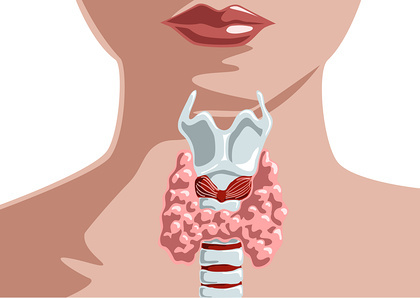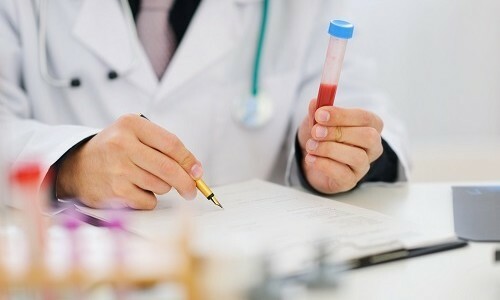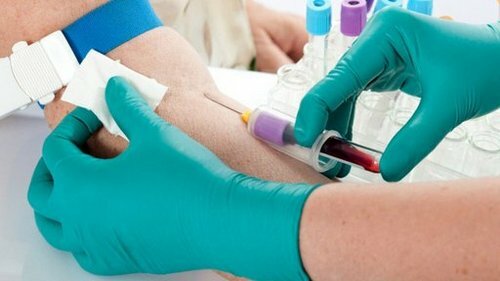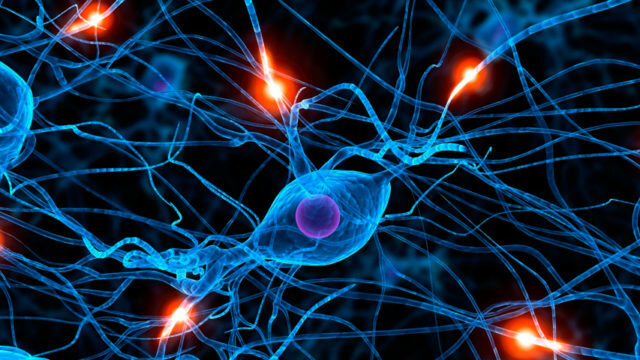Thyroid gland is one of the organs of the endocrine system. It is located in the area of the epithelial cartilage under the larynx. It synthesizes a number of important iodine-containing hormones( T3 and T4), as well as calcitonin, which regulates the exchange of calcium in the body. It has basically 3 parts:
- right,
- left,
- isthmus.
It is not worth underestimating this body, as it performs a number of vital functions. These include:
- maintenance and regulation of basic metabolism. All metabolic reactions inside the body are monitored,
- provides a stable temperature,
- prevents bone fragility, by inhibiting osteoporosis,
- is involved in the growth and development of the body and the central nervous system.
There are cases when the pathology of the thyroid gland develops. It can manifest itself as a whole complex of various symptoms. To accurately verify the diagnosis and determine the further method of treatment, blood tests for specific hormones must be submitted.
How are thyroid hormones synthesized and why are they needed?

The basis for the creation of these biologically active substances is the amino acid tyrosine. In the process of nutrition, iodine enters the body. For adequate work of the body, it is necessary to receive approximately 120-135 μg of this trace element per day. After entering the intestine, it is absorbed by the fibers of the epithelium and, with blood flow, settles in the follicles of the organ. There is a process of incorporation of iodine into the thyroglobulin matrix( protein, a precursor of biologically active substances).
After this, there is a differentiation of hormones to T3 and T4, depending on the number of molecules of the microelement in its composition.
You should also know that the amount of synthesized T4 is 20 times higher than T3.But the effectiveness of the latter is 6-8 times higher than that of thyroxine. That's why you can not talk about the greater importance of a substance.
The main functions that perform these substances in the human body are as follows:
- Activation of the thermoregulatory center. Increased heat production and oxygen uptake by all tissues and cells except for the main brain, spleen and testicles. They remain intact. That is why one of the symptoms of hyperthyroidism or hyperthyroidism is fever and profuse sweating.
- Stimulation of the formation of steroids by the adrenal cortex. T3 and T4 play an important role in the process of growth and development of the whole organism. With their shortage, mental and physical retardation are often observed.
- Increased consumption of vitamins by the body.
- Activation of the brain's nervous and mental activity. In areas where there is little iodine in the soil, children in schools are regularly given Antistrum, a drug that contains a 5-day supply of this trace element. This is done to improve their performance and normalize the work of the central nervous system.
The question of how much this substance is needed in the human body for its normal functioning is well studied. There are special tables and generally accepted indicators that indicate the functional activity of the organ. It is enough to take the material for examination and wait a bit.
When is it necessary to be surveyed?

It should be understood that similar laboratory tests should be conducted to confirm the clinical thought of the treating physician. Nevertheless, it is possible to additionally donate blood for analysis with a preventive purpose. Often there are situations when the pathological process is already started, but still takes place in the latent stage. In this case, you can act on the lead and begin to treat the ailment at an early stage.
However, the indications for checking the thyroid status are as follows:
- Hypo- or hyperthyroidism. The determination of the number of organ hormones can accurately indicate the functional activity of parenchyma and thyroid cells.
- Quality control of treatment and effectiveness of the therapy. This is especially important for diffuse toxic goiter and hypothyroidism.
- Mental retardation in the development of children. They donate blood in order to verify the possible cause of such a pathology. Cretinism is one of many diseases that causes CNS disorders at an early age.
- Any increase in the size of the thyroid( goiter).
- Heart rhythm disturbances( arrhythmias, tachycardia, extrasystole).
- Alopecia.
- Disorders of the reproductive system with possible infertility.
- Absence of menstruation.
- Impotence or decreased traction to the opposite sex.
In all these situations, it is necessary to donate blood for tests with the measurement of the hormone concentration of the organ in the serum.
Hormones and active ingredients

Many patients, when they hear that they need to check the condition of the thyroid gland, do not always know what substances the doctors are looking for in their blood and how many of them there should be. The main indicators of the functional activity of the body are:
- Hormones of the pituitary and hypothalamus( organs of the highest regulation of the endocrine system):
- Thyreoliberin and thyreostatin. Both substances respectively activate and inhibit the pituitary.
- Thyroid-stimulating hormone( TTG) - the most important biologically active compound, which causes the body to separate its own regulatory substances. Its amount in the blood increases with a weak function of the thyroid gland and vice versa.
- Iodine-containing hormones:
- Triiodothyronine( T3) - stimulates the consumption of O2 tissues. Normal indices are 2.5-5.6 pmol / l.
- Thyroxine( T4) - stimulates the process of creating proteins. The normal values are 9-20 pmol / l.
- Other substances:
- Calcitonin. Responsible for osteoclasts suppression and osteoblast activation. Prevents the resorption of bone tissue and protects the skeleton from osteoporosis.
- Antibodies to thyroglobulin( ATTG).They are specific immunoglobulins that appear when the body's defense system is compromised with the development of autoimmune processes. Most often they are recorded in Hoshimoto's goiter. Normal indices are 0-15 U / ml.
- Antibodies to thyroid peroxidase( ATTPO or microsomal antibodies).Specific immunoglobulins to thyroid tissue. The most accurate and sensitive test for identifying an autoimmune process. Normal values are below 5 U / l.
We must understand that it is not always worthwhile to conduct a study of absolutely all the above indicators. The doctor himself is guided by what he wants to know. The price of the tests can sometimes be too high for some patients, so the doctor sometimes thinks twice about which tests to pass on to a particular patient.
Preparation for the

Examination A very important point in an adequate check of the functional activity of the thyroid gland is the qualitatively handed over tests. If you ignore the procedure for appropriate training, the results of such a study may be unreliable. In this case, you will have to take additional blood to confirm or deny the diagnosis.
To avoid any doubt, and the results of the analyzes were correct, it is worth following some rules:
- 30 days before the tests, it is necessary to stop using drugs that contain T3 and T4.They will significantly affect the final conclusion of the laboratory assistant and will not give an objective assessment of the functional activity of the organ under investigation. An exception may be special instructions or doctor's recommendations.
- 2-3 days before the patient will take tests, he must exclude from the diet products containing iodine( sea kale, fish oil, potatoes, spinach).
- Immediately 24 hours before the study should be limited to the use of alcohol, tobacco. Minimize stress and exercise.
- The blood must be taken on an empty stomach for analysis. You can not eat 12 hours before testing.
- Conducting a variety of X-ray examinations can be carried out only after the delivery of serum for the determination of hormones T3, T4 and TTG.
To comply with these simple rules is enough to get a high-quality, and most importantly - a reliable result. Basically, the deciphering of these analyzes requires one day for the lab technician. If the serum was given in the morning, then by the evening you can expect ready conclusions of the doctor. However, as practice shows, patients receive forms with detailed descriptions of all indicators only the next day.
Interpretation of

It is necessary to understand what figures indicate the hyperfunction of the organ, and which, on the contrary, speak of its reduced activity. In any case, doctors do this, and only they can objectively assess any changes in the patient's blood. For an average person, it is enough to know how to properly surrender the material for examination and navigate in the following terms:
- Similar values relative to the average in the column "Normal" - the function of the thyroid gland is not violated.
- Indicators above the norm - hyperfunction. Possible causes are diffuse toxic goiter, thyroiditis, adenoma.
- Indicators below the norm - hypofunction. The body does not produce enough hormones, which may be a consequence of hypothyroidism, Hashimoto's goiter, cancer.
For medical professionals and simply patients who want to learn a little more about their ailment, there is a special tablet. It helps in more detail to understand the pathogenesis and mechanism of the development of a particular organ damage.
| Triiodothyronine( T3) | Thyroxine( T4) | TTG | ATTG | ATTPO |
| primary hypothyroidism | below or within normal limits | below or within normal limits | Increased | |
| secondary hypothyroidism | Below normal | Below normal | Below normal | |
| Hyperthyroidism | Increased | Increased | Below norm | |
| Autoimmune, subacute thyroiditis | Possible manifestations of both hypo- and hyperfunction types | Increased | Increased |
To find out how the shield worksprominent iron in an individual patient, it is necessary to pass the relevant tests. With the proper conduct of the examination, it will be very quickly possible to determine the nature of the organ damage. However, it is not enough to pass the serum. It is necessary to choose adequate therapy. Only in this case it will be possible to cure the patient.



